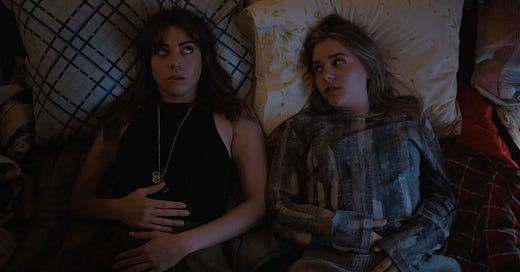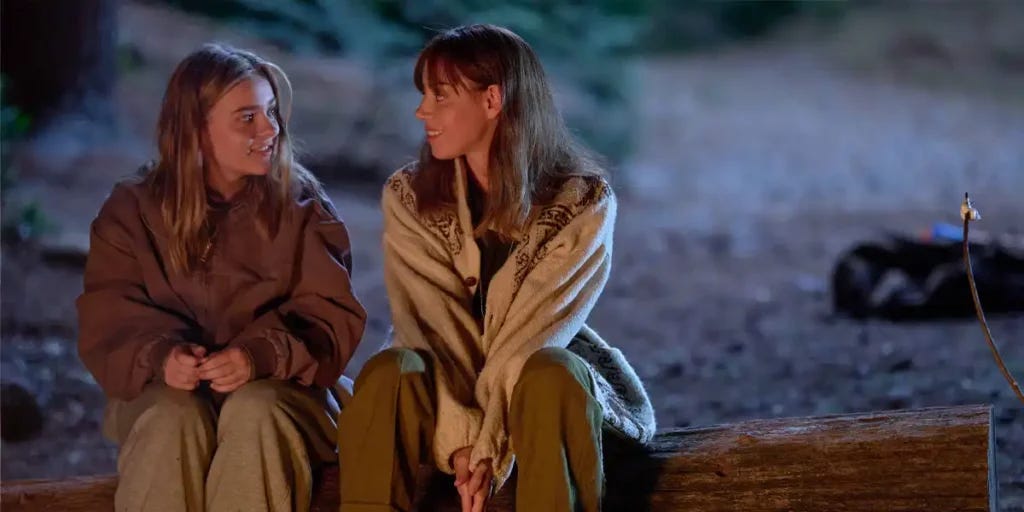A Movie That Finally Understands Gen-Z
Shoutout to Massive Cinema for the free tickets to 'My Old Ass'
My Old Ass is director Megan Park’s sophomore feature starring Aubrey Plaza and introducing Maisy Stella, both as Elliott. After a bad trip on her 18th birthday, Elliott conjures her 39-year-old self, played by Aubrey Plaza, whom she begins to seek life advice from to prevent bad things from happening to her in the future.
Credit: MGM Studios (2024)
I usually go into movies written by the older generation about Gen-Z very warily. This is not meant to be taken offence to, but I think it’s fair to say that most movies about Gen-Z written by older generations come across at best as disingenuous and, at worst, unbelievably cringe-worthy. It’s unfortunate that off the top of my head, I can only name a maximum of five movies from the past few years that have been able to pull off writing Gen-Z. What makes writing Gen-Z so difficult is how vast the majority of our dialect changes, so you have to be tactical about writing these characters before their speech becomes outdated. I think it can be argued that our language has its own trends, that vibrantly thrive and die just as quickly. It was only a month ago that the term '“demure” was everywhere, and now it’s dying a painful death. Where movies like Bodies Bodies Bodies go right with their characters is the focus on mannerisms, manner of communication and attitude. The comedy in Bodies Bodies Bodies will age so well because of its focus on these three attributes of characterisation rather than what words are being spoken.
This also happens to be where My Old Ass goes right. As I mentioned before, nailing down Gen-Z dialect can be an impossible task because of how vapid it tends to be. Writers are tasked with writing characters that feel authentic to the time, but it can become difficult to judge what language is “trending” and what is timeless for Gen-Z. Whilst My Old Ass is not void of this language, whenever it’s used, it’s used tactically and well. A standout example would be when the younger version of Elliott uses the slang “gagged”. Urban Dictionary defines “gagged” as:
“Gagged”
To be amazed or stunned by someone or a situation of some kind. A term often used within the LGBT community and the ballroom club scene.
After Elliott uses this term in her sentence, her older self expresses disgust and replies, “Nobody uses “gagged” anymore”. If you look closer at the definition provided, you realise how clever this was to include. Not only is it reflective of the language of the time, but it avoids expiration because of older Elliott’s reaction. It also tells us more about Elliott’s character. Elliott identifies as a part of the LGBTQ+ community, and “gagged” is a term typically used by members of that community. Finally, it tells us about the people she surrounds herself with, as dialect tends to bounce between people who associate with each other.
Credit: MGM Studios (2024)
Furthermore, My Old Ass' writing success comes down to the timeless characterisation of Elliott. Generations for years to come will be able to relate to her in the way we relate to characters like Lady Bird, Charlie Kenmeckis and Neil Perry. Maisy Stella perfectly encapsulates an awkward, cynical 18-year-old girl moving away from home for the first time. Despite being set in the modern day, this is an almost universal experience. A mix of anxiety over being in an unfamiliar environment away from family for the first time and excitement over the same thing. Uncertainty over the future is the key central theme of this movie. Aubrey Plaza’s older Elliott is a manifestation of the desire to ask your older self how things play out for you. Elliott is attempting to relieve the fear of the unknown despite risking “spoiling the surprises of life.”
My Old Ass deserves its flowers. If it’s coming to a cinema near you, please try your best to go and see it.





